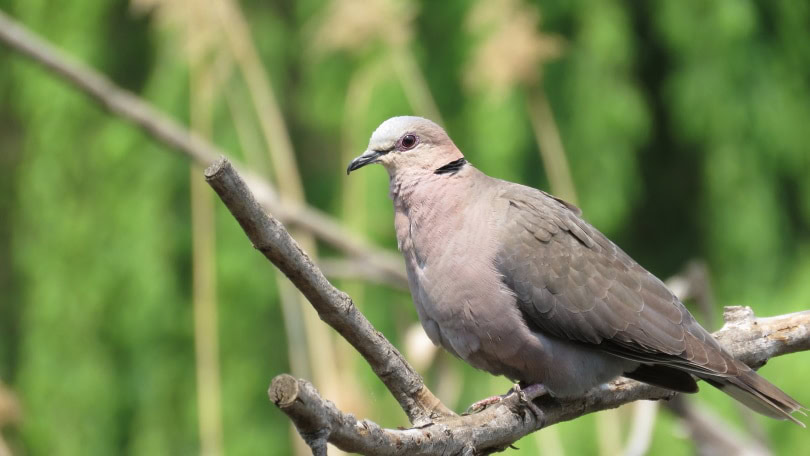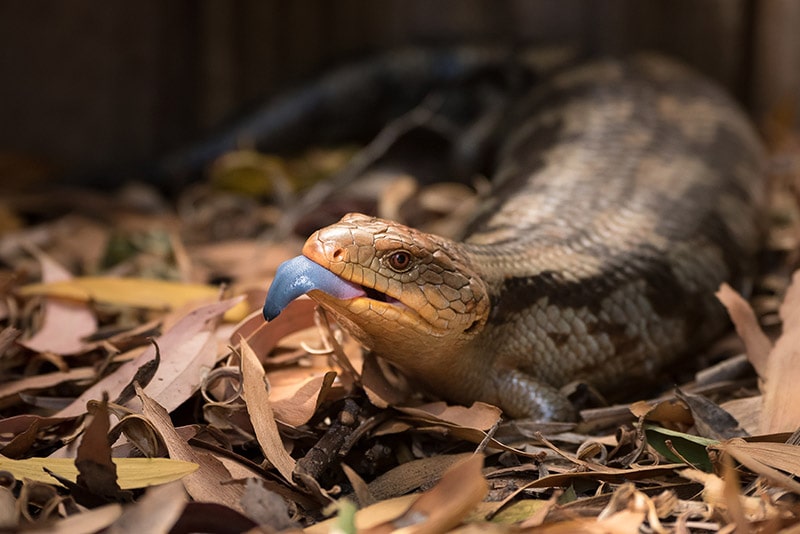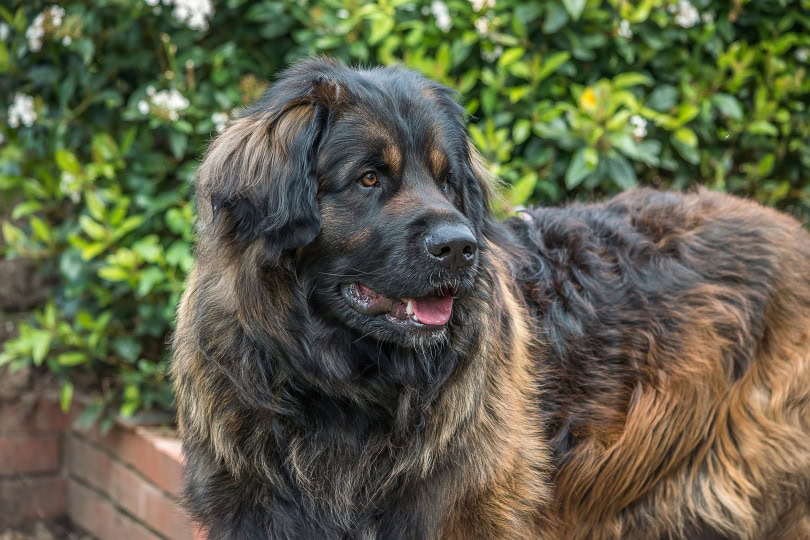Click to Skip Ahead
You can find the ring-necked dove almost anywhere in Eastern and Southern Africa. It’s a sedentary bird that’s found in many habitats but prefers open environments with a good view of its surroundings. It can make a perfect pet for someone looking for a bird that doesn’t make much noise. If you are thinking about getting one of these for your home but would like to learn more about it first, keep reading while we discuss their temperament, diet, care requirements, health issues, and more to help you make an informed decision.

Species Overview
| Common Names: | Ring-necked dove, cape turtle dove, half-collared dove |
| Scientific Name: | Streptopelia capicola |
| Adult Size: | 9–11 inches |
| Life Expectancy: | 10–15 years |
Origin and History
The African ring-necked dove is native to Africa and is suited to many environments, including woodlands, farmhouses, open plantations, and acacia tickets. Most of all, they prefer grasslands near trees. Residents can attract more ring-necked doves by planting trees around their homes. Predators of this bird include sparrowhawks, falcons, snakes, and grey squirrels.
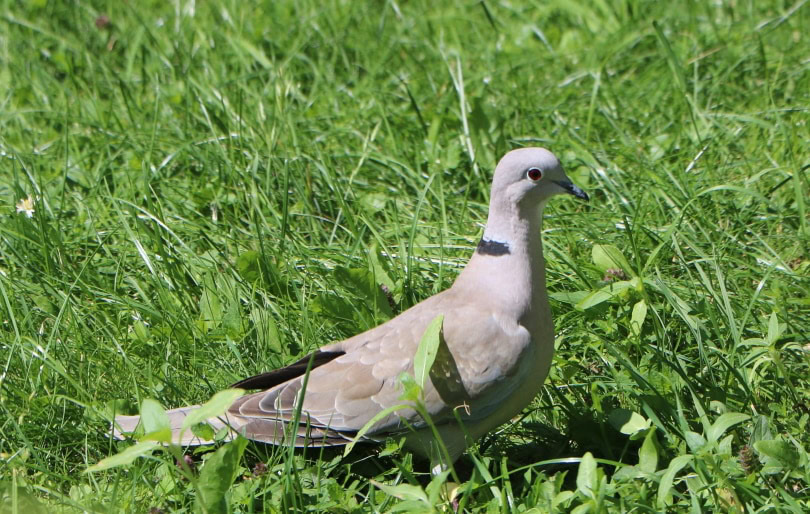
Temperament
The ring-necked dove is unlike many other bird species in that you will usually find them alone or in pairs instead of a large flock. The only exception to this is by watering holes in their natural habitat where they will form larger groups. These birds are easygoing and prefer to lounge around most of the day, even in the wild. This bird’s call can be quite harsh, especially if you have more than one, but the songs are less frequent than other birds. They are active during the day, especially early mornings and afternoons when they look for food and water.
- Sedentary lifestyle
- Prefers to live alone or with a partner
- Long lifespan
- Abrasive calls
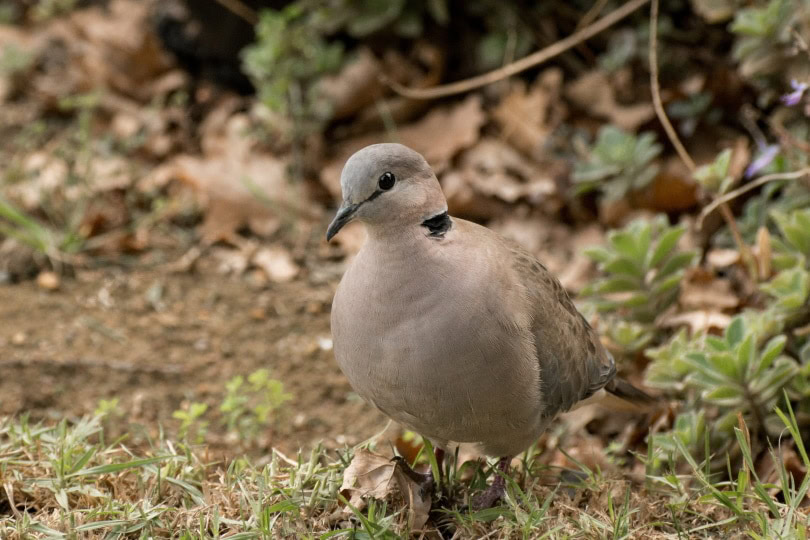
Speech & Vocalizations
As we mentioned earlier, your ring-necked dove will make some abrasive calls throughout the day. It will often repeat the same “kuk-COORRRR-uk” phrase several times in a row randomly throughout the day. You may also hear a “wuh-ka-RROOO,” “kooorr,” or “knarrrrrr” on occasion, especially if the bird gets startled or is excited.
Ring-Necked Dove Colors and Markings
The ring-necked dove gets its name from the ring of black feathers on its neck. It is most prominent on the back of the head, with a short gap in front. Its body is dull tones of grey and brown with lavender highlights on the nape. The belly is white, and there are white tips on the gray tail feathers.
Six subspecies are virtually identical except for paler plumage, and captive breeding has allowed some birds to have a light-colored ring instead of the traditional black.
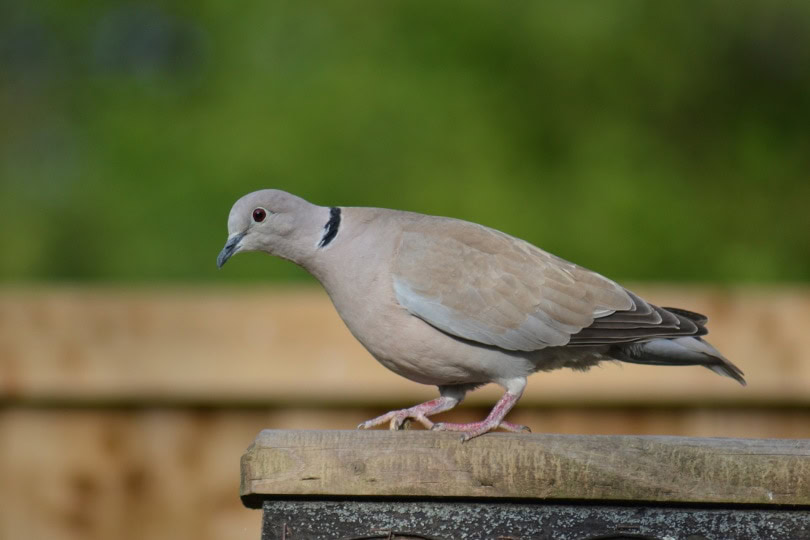
Caring for the Ring-Necked Dove
The ring-necked dove is content to live alone but will also enjoy a partner. It’s a sedentary bird that doesn’t need as much attention as other birds, but general care is about the same. You will need a cage about 2 feet deep and 3 feet wide with a height of 2 feet, but that is the minimum, and a larger cage is much better. The spaces between bars should be about 1/2 inch. You won’t need to worry about temperature or humidity since these birds do well at room temperature. It eats seeds, fruits, and insects in the wild but primarily eats commercial dove food in captivity.
Common Health Problems
Your ring-necked dove will have few health problems in captivity, and the biggest concern is usually cold drafts that can cause a cold. In the wild, they are susceptible to pigeon pox, which is the result of a virus. Infected water and mosquitos are the primary cause of this disease, but luckily, the risk is low for captive birds.
Other diseases transmitted through fleas and ticks also occur in the wild but are unlikely to affect your bird, allowing it a better chance of reaching its maximum lifespan of more than 10 years. If your pet is sick, you will likely notice it sitting in the corner being even less active than normal. The bird calls will probably be less frequent and lower in volume. We recommend taking your pet to the vet immediately if you notice it behaving strangely.
Diet and Nutrition
As we mentioned earlier, wild ring-necked doves have a varied diet consisting of seeds, fruits, berries, and even insects that it hunts during the early morning hours. You will try to provide a varied diet to your pet as well, but the fruits and berries will be treats, and the bulk of its food will be a commercial dove food that uses a special formula that will ensure your bird gets a balanced diet with the nutrients it needs to stay healthy.
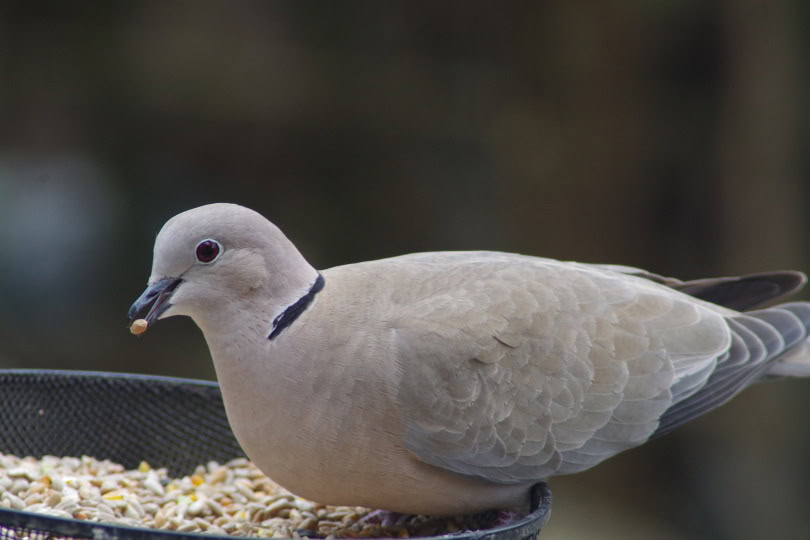
Exercise
Your ring-necked dove won’t need any dedicated exercise but allowing it time out of the cage each day can help it stretch out its wings and burn off some calories, which will help reduce some of the harsh squawkings that you hear. Allowing your bird time outside the cage will also help you form a stronger bond with your bird.
Inside the cage, you can provide your bird with toys, like a mirror, water dish, stuffed animals, and pieces of wood, that will provide your bird with mental stimulation.
Where to Adopt or Buy a Ring-Necked Dove
The best place to purchase your ring-necked dove is your local animal shelter. Unfortunately, many people are unprepared for the harsh calls of these birds or their long lifespan. Many also want something more colorful or playful, so finding one at a shelter is not uncommon. These birds will usually be less expensive than other sources and will also have any required vaccinations.
If there is none at your local shelters, you can check your local pet store and ask your local breeders to find one, but since these birds are not as popular as some others, ordering one over the internet is likely the easiest way. We were able to find several birds for sale between $50 and $100 by searching online.


Conclusion
The ring-necked dove can make a great pet for someone that prefers a sedentary bird that sits around looking out the window all day instead of hopping between perches singing songs. While the calls can be sharp, they are much less frequent than most parrots, so they are not usually a problem in apartments, and they have almost no health problems.
We hope you have enjoyed reading over this short guide and found the answers you need. If we have helped convince you to get one of these wonderful birds for your next pet, please share this guide on Facebook or X (formerly Twitter).
See Also:
Featured Image Credit: kgb224, Shutterstock
